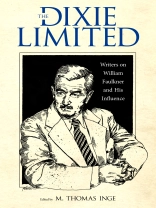Flannery O’Connor once noted, “The presence alone of Faulkner in our midst makes a great difference in what the writer can and cannot permit himself to do. Nobody wants his mule and wagon stalled on the same track the Dixie Limited is roaring down.” Her railroading metaphor wittily captures much of the respect and unease Faulkner’s example brought the worldwide community of authors.
Few other writers have exerted as profound an influence on literature as Faulkner. Prominent literary scholar M. Thomas Inge documents the scope of his influence in the twentieth century through the words of those writers themselves.
This collection of essays offers a survey attempting to capture exactly what Faulkner meant to his literary peers and colleagues both in the United States and abroad. Inge has combed essays, articles, reviews, letters, and comments written by over forty novelists, poets, and playwrights about Faulkner’s fiction and the power of his literary accomplishment. Many major American writers sound off here, as well as important figures from France, England, Japan, and South America.
Some speak about his technical virtuosity and how this expertise has directly influenced them, and others express the difficulties of trying to escape his example. A few even criticize him for what they see as artistic failures. The variety of responses demonstrate, in any case, that Faulkner created an unavoidable power in his own time and remains a permanent force in literature.
关于作者
M. Thomas Inge (1936-2021) was Robert Emory Blackwell Professor of the Humanities at Randolph-Macon College. He edited or authored over sixty volumes, including books on Charles M. Schulz, the comics, William Faulkner, and Oliver W. Harrington. Inge was general editor of two University Press of Mississippi series, Conversations with Comic Artists and Great Comics Artists.












